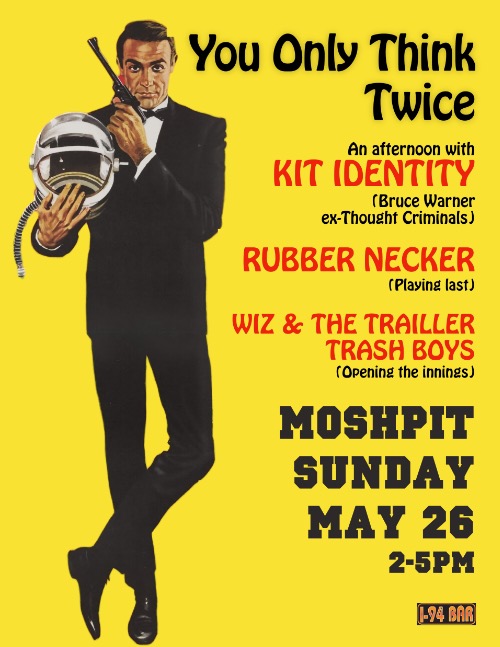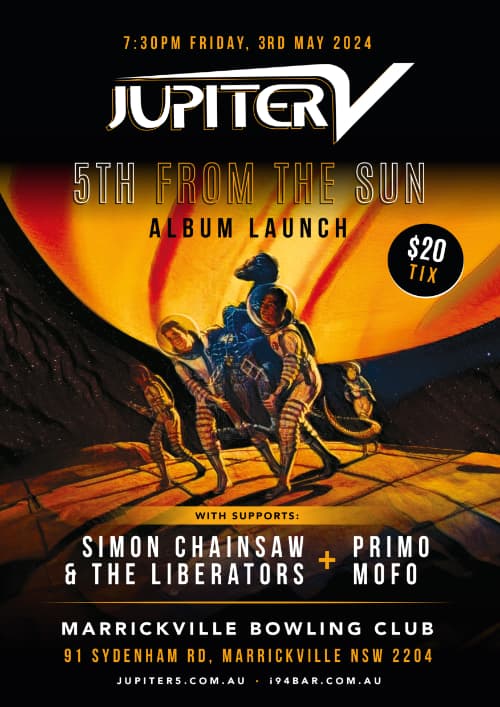
lou reed
Send us stuff to review
PO Box 334
Oatley NSW
2223 Australia
Get in touch: barman@i94bar.com
The Living Eye

I-94 Bar Records presnts
Jupiter 5
"Fifth From The Sun" CD Launch
+ Simon Chainsaw & The Liberators + Primo Mofo
Marrickville Bowling Club
- May 3
Tickets
Joeys Coop
10th Anniversary Show
Camelot Lounge, Marrickville
- May 4
Tickets
The Skids Australian Tour
MAY
2 - Brisbane, The Triffid
3 - Sydney, Manning Bar
4 - Melbourne, Max Watts
10 - Adelaide, The Gov
11 - Perth, Rosemount Hotel
Tickets
I-94 Bar presents
"You Only Think Twice
An Afternoon With Kit Identity"
Kit Identity
(Bruce Warner ex-Thought Criminals)
+ Rubber Necker
(playing middle set)
Wiz & The Trailler Trash Boys
MoshPit Bar, Enmore, NSW
- May 26
(2-5pm)
I-94 Bar presents
Psychotic Turnbuckles
“40 Years Undefeated”
+ Starcrazy + The Vibrajets
The Tote, Melbourne
- June 29
Tix
+ The Fadeaways (JPN)
+ Bahne Super-Flex
+ The Strike-Outs
The Crowbar, Sydney
- July 13
Tix
+ The Dangermen
+ The Busymen
The Black Bear Lodge, Brisbane
- Sept 7
Tix
Radio Birdman
“Birdman 5-O!”
JUNE
+ Civic
21 – Croxton Bandroom, VIC
22 – Croxton Bandroom, VIC
23 – The Gov, Adelaide
+ TBA
28 – The Triffid, Brisbane
29 – The Triffid, Brisbane
+ HITS
JULY
5 – Manning Bar, Sydney - SOLD OUT
6 – Manning Bar, Sydney - SOLD OUT
7 – Manning Bar, Sydney
+ Hard-Ons
The Fadeaways
Australian Tour
JULY
Thu 11- Bridge Hotel, Castlemaine. VIC
Fri 12 – The Tote, Collingwood, VIC
Sat 13 – The Crowbar, Leichhardt, NSW
Sun 14 – MoshPit Bar, Enmore, NSW
The Stems
40th Anniversary Australian Tour
AUG
24 – Corner Hotel, Melbourne
25 – The Gov, Adelaide
30 – The Zoo, Brisbane
31 – Manning Bar, Sydney
SEP
5 – Freo Social, Fremantle
Tickets here
Buzzocks Australian Tour
OCT
25 - Brisbane - The Triffid
26 - Adelaide - The Gov
27 - Fremantle - Metropolis
31 - Newcastle - King St Bandroom
NOV
1 - Sydney - Metro Theatre
2 - Melb - Northcote Theatre
3 - Lorne - Lorne Theatre
4 – Castlemaine - Theatre Royal
Tix
Fresh Reviews
-
Escape your problems and focus on Mark Steiner's instead
23 April 2024
-
All punk rock, all the time
13 April 2024
-
There ain't no shade in Hades and Jupiter 5's debut is just as hot
13 April 2024
-
Welcome aboard! These Pilots steer their own course
29 March 2024
-
Guitars and spirit make Flowers For Jayne's latest a keeper
24 March 2024
All content © 2014 I-94 Bar
c/o PO Box 334 Oatley 2223 Australia


